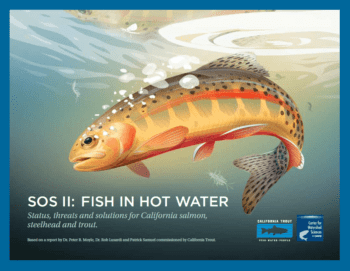Trout Clout – Your comments needed now to ESA list Klamath-Trinity spring-run Chinook salmon
Salmon need our help. California Trout is proud to support the Karuk Tribe and the Salmon River Restoration Council efforts to list Upper Klamath-Trinity Rivers spring-run Chinook on California’s Endangered Species List. ESA listing would provide these iconic fish the protections they deserve and create opportunities to fund habitat restoration.
 Take Action Now. CalTrout’s roots are in protecting California’s unique fisheries and we are thrilled to support this important effort to list a salmonid on the edge of extinction. We urge our members to help in the listing process by submitting written comments.
Take Action Now. CalTrout’s roots are in protecting California’s unique fisheries and we are thrilled to support this important effort to list a salmonid on the edge of extinction. We urge our members to help in the listing process by submitting written comments.
Click here to submit comments to the Fish and Game Commission now.
Why this is necessary. CalTrout believes that there is a substantial scientific basis to list the Upper Klamath-Trinity River spring-run Chinook and our SOS II Report outlines the critical level of concern surrounding them. The current population is at a record low and dams and diversions limit their access to spawning habitat making them vulnerable to extinction. Recently published peer-reviewed studies reveal that the Klamtah-Trinity spring-run Chinook are genetically distinct from fall run counterparts. This means we are at risk of losing important genetic information key to the long term survival of Klamath-Trinity salmon runs forever. Further, Klamath-Trinity spring-run Chinook are fundamental to the tribal cultures in the Klamath region who have relied on this fish as a staple food for millennia.
Written comments due by 5 p.m. on January 24. You may email to fgc@fgc.ca.gov or mail to:
California Fish and Game Commission
P.O. Box 944209
Sacramento, CA 94244-2090
Tell the Commissioners in person to protect Klamath-Trinity Spring-Run Chinook at the California Fish and Game Commission hearing on February 6 at 8:30 a.m. The meeting is at:
California Natural Resources Building
First Floor Auditorium
1416 Ninth Street
Sacramento, CA 95814.





